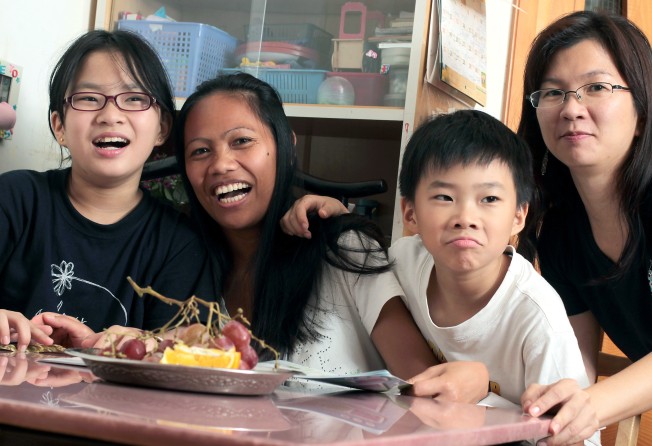Hong Kong should love its foreign domestic helpers, so they will love Hong Kong
Jason Hung says ethnic minorities’ quest to have their rights recognised in Hong Kong starts with Hongkongers ending their master-servant relationship with domestic helpers, and being more than just good bosses

Recently, while in England, my Filipino friends and I were poking fun at each other, being very sarcastic. We have different skin colours, mother tongues and cultures but have earned one another’s respect and are fond of making jokes about each other. We are very close companions at college, at home and elsewhere. Though we look different, we know we are equal as human beings.
Contrast that with this week, when I travelled back to Hong Kong to enjoy a holiday with my family. At one gathering, I met two Filipino domestic helpers, Jenny and Anna, who work for my relatives. I addressed myself as “Jason” and tried to greet Jenny and Anna in as friendly a manner as I could. However, they often would only reply “Yes, sir” in a very humble tone and disciplined manner.
Their attitude was a reminder of the entrenched social hierarchy in the city, between Hong Kong Chinese and foreign domestic helpers. The former are often understood as the masters, while the latter are the servants. This type of social hierarchy bars Filipino domestic helpers, and others, from earning the respect they are entitled to, and that they receive elsewhere.
There is also evidence of such social barriers in the numerous discrimination and domestic abuse cases reported in Hong Kong. One recent example, last month, took place in a Hong Kong park, where a local woman was filmed yelling at a Filipino domestic helper, saying: “You are just a helper, OK?” This it is not just a problem of a Chinese person verbally abusing a domestic helper, but an example of how empathy for foreign domestic helpers is often lacking in this city.
Joan Cordero, a friend and Filipino news reporter at GMA News and Public Affairs, told me, “Even though there are lots of Filipinos working in Hong Kong, it is not [certain] that Hong Kong nationals would eventually consider, or accept, Filipinos as a minority group.” Apparently, a change in attitudes toward Filipinos’ social status would require a recognition of minority rights.
At our family gathering, I brought up the topic of Hong Kong-Filipino relationships in the city. Both Jenny and Anna showed gratitude towards their employers for respecting their rights. “As long as we have good employers, we love Hong Kong,” they said.
However, both admitted that some of their friends are exploited by their employers. Indeed, a 2017 poll by the Mission for Migrant Workers found that, for example, 60 per cent of domestic helpers do not have adequate living environments and 35 per cent lacked basic privacy.
Being a good employer should mean more than simply complying with an employment contract. It also means recognising the legal rights of domestic helpers. While Hong Kong Chinese employers and foreign domestic helpers have a master-servant relationship, we should remember that these foreign workers are people entitled to respect – nothing less. They should be treated as fellow human beings, and even friends, since they have feelings like anyone else.
Foreign domestic helpers sacrifice their personal dreams by moving away from home to unexplored, unknown territories. They endeavour to fulfil their domestic tasks and exercise a good work ethic, even when they encounter ill-mannered, condescending employers. They would welcome more respect for their legal rights, along with all the inherent human rights which everyone deserves.
Anna and Jenny are very fortunate; their employers treat them well, both as domestic helpers and friends. They have built ties with their employers, and these bonds help to strengthen their sense of belonging in Hong Kong.
However, not all Filipino domestic helpers, or those from other parts of the region, are as fortunate, especially when many see social benefits as privileges rather than rights. Sometimes I wonder, “Will most Filipinos one day love Hong Kong?”
Bluntly speaking, perhaps it’s Hong Kong nationals who should be the ones to answer this question. If we want foreign domestic helpers to love Hong Kong, they should first be loved in Hong Kong. Above all, the inherent and demeaning social hierarchy between Hong Kong Chinese employers and foreign domestic workers has to be rooted out. At the end of the day, we might look different. However, we should know that we are all equal as human beings.
Jason Hung will be a visiting scholar at the University of California, Berkeley, this summer and is a former visiting scholar at UCLA